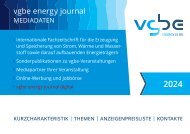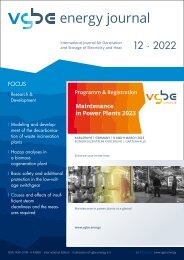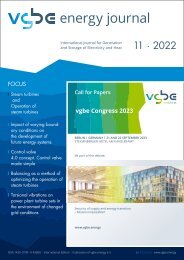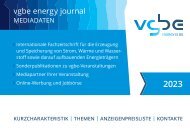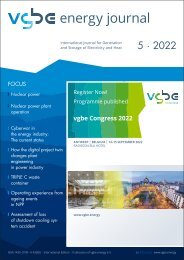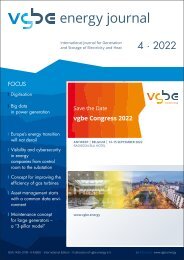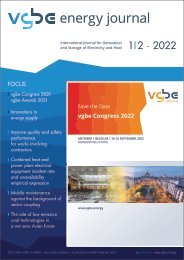VGB POWERTECH 11 (2019)
VGB PowerTech - International Journal for Generation and Storage of Electricity and Heat. Issue 11 (2019). Technical Journal of the VGB PowerTech Association. Energy is us! Power plant operation: legal & technology. Pumped hydro storage. Latent heat storages.
VGB PowerTech - International Journal for Generation and Storage of Electricity and Heat. Issue 11 (2019).
Technical Journal of the VGB PowerTech Association. Energy is us!
Power plant operation: legal & technology. Pumped hydro storage. Latent heat storages.
You also want an ePaper? Increase the reach of your titles
YUMPU automatically turns print PDFs into web optimized ePapers that Google loves.
A journey through 100 years <strong>VGB</strong> | <strong>VGB</strong> <strong>POWERTECH</strong> 1 (2002)<br />
Supply Security<br />
energy supply. Put more bluntly, it is simply<br />
unsustainable.<br />
Changes<br />
These trends have been going on for a long<br />
time, but several parallel changes make it<br />
more urgent than ever to tackle them.<br />
— First, and most pressing at the moment,<br />
are geopolitical changes. Although oil<br />
markets have not been unusually volatile<br />
over the last month, the so-called war on<br />
terrorism calls for vigilance, both from<br />
policy makers and from energy producers.<br />
— Second, rising demand in developing<br />
countries, linked to economic growth, are<br />
beginning to increase the competition<br />
among our traditional suppliers for fossil<br />
fuels. Even though reserves are not<br />
threatened with exhaustion, there is some<br />
question over the ability of suppliers to<br />
increase their capacity accordingly.<br />
— Third – and it might not have escaped<br />
your attention that my first three points<br />
all relate to external developments more<br />
or less outside of our control – international<br />
oil markets over the past few<br />
years have been far from stable. I do not<br />
need to remind you how important stable<br />
markets are to industry and investment. It<br />
is difficult to predict which way the oil<br />
price will go over the coming months.<br />
Whichever way it moves, it could have a<br />
lasting impact on economic and industrial<br />
strategies.<br />
Within Europe, the future contribution of nuclear,<br />
coal and renewable energy to electricity<br />
generation is also far from clear. Several<br />
member states have announced a moratorium<br />
on nuclear power, others are not<br />
building new capacity to replace plants<br />
coming our of operation. This could leave a<br />
dangerous gap in our power capacity, as well<br />
as drive us towards forms of electricity generation<br />
which produce far more greenhouse<br />
gas emissions. How big this risk is depends<br />
to some extent on how far the market absorbs<br />
renewable energies and how successful we<br />
are in applying clean coal technologies. I<br />
shall come back to this presently.<br />
— Finally, current economic circumstances<br />
are putting pressure on companies’ finances.<br />
This is unfavourable for investment<br />
in energy technology development.<br />
Yet high levels of investment in clean<br />
energy technology are precisely what we<br />
need if we are to maintain our high technological<br />
base in the energy field. We also<br />
need to invest heavily in new technology<br />
in order to reduce our greenhouse<br />
gas emissions and to increase the use of<br />
cleaner renewable energy sources. If, as<br />
some economists maintain, the world<br />
economy is entering a global recession,<br />
then this is not only bad news for energy<br />
technology advances in Europe. It also<br />
acts as a brake on investment in clean<br />
technology in other parts of the world.<br />
As far as electricity is concerned, if demand<br />
continues to grow according to current<br />
trends, we shall need to invest heavily in new<br />
capacity. With demand rising on average by<br />
2% per year in member states, and 3 % in<br />
candidate countries, it is estimated that<br />
600 000 MW will be needed over the next<br />
twenty years to replace power stations<br />
coming out of production and to meet increased<br />
demand. This corresponds to two or<br />
three plants of 1000 MW being constructed<br />
every month for 20 years.<br />
How far can we reduce the need for new<br />
plants? And what sort of plants will we<br />
build? I expect that these and similar questions<br />
will come under the microscope today.<br />
In the European Commission, we do not have<br />
the answers. Each form of energy has advantages<br />
and disadvantages, and these, I am<br />
sure, will be expounded by many renowned<br />
specialists in the course of the next two days.<br />
In our view the key is diversification – that<br />
is, keeping the range of energy options as<br />
wide as possible. But, in a truly liberalised<br />
and open market, it is ultimately consumers<br />
and companies who will take the lead.<br />
Strategic Energy Challenge<br />
More than ever before, the delicate interplay<br />
between energy needs, environmental objectives<br />
and sound economic development is<br />
being put to the test. Yet our future health<br />
and wealth depend on finding the right balance<br />
between these three demands. This is<br />
what I would term the European Union’s<br />
strategic energy challenge. We need to secure<br />
a sustainable energy supply for Europe, one<br />
which will withstand changes to international,<br />
economic and environmental circumstances.<br />
What is at stake is Europe’s future<br />
energy supply.<br />
In the Commission’s view, the size of this<br />
challenge makes it essential for Europe to develop<br />
a sustainable energy strategy, within a<br />
stable long term framework, providing a firm<br />
foundation for Europe’s future role on the<br />
world stage. This strategy should benefit industry,<br />
consumers and the environment alike.<br />
I would now like to elaborate on the approach<br />
we are taking in order to reach this<br />
ambitious goal.<br />
Approach<br />
We are not going to reach our objective overnight.<br />
It will need patience from policy<br />
makers, investment from industry and initiative<br />
from consumers. However, the current<br />
debate on the Green Paper is helping us to<br />
formulate our ideas. And I am happy to share<br />
some of these with you today.<br />
Energy Demand Management<br />
First, we remain convinced that a proactive<br />
approach to energy saving is crucial first step<br />
to developing a sustainable energy supply<br />
policy. Put very simply, each kilowatt saved<br />
equates to at least one kilowatt less which has<br />
to be supplied. It follows therefore that energy<br />
saving can be a direct means of improving<br />
prospects for energy supply. We therefore<br />
see energy saving as a cornerstone of a sustainable<br />
energy supply.<br />
Liberal Markets<br />
A second cornerstone is a liberal and open internal<br />
market for electricity and gas. With<br />
this in mind the European Commission proposed<br />
earlier this year a set of new measures<br />
designed to bring forward the schedule of the<br />
internal energy market, to reinforce the conditions<br />
which encourage real and fair competition,<br />
and to introduce a genuine single<br />
market.<br />
As Mrs de Palacio Vice-President of the<br />
Commission responsible for Energy and<br />
Transport, announced in March 2001. These<br />
new proposals constitute a decisive step towards<br />
providing the people of Europe with<br />
the most advanced and integrated electricity<br />
and gas system, offering the best guarantees<br />
of security of supply and consumer protection<br />
and bringing real benefits in terms of<br />
competition, prices and competitiveness.<br />
Above all, the proposals will create a future<br />
European energy market which offers greater<br />
choice while providing all Europeans with a<br />
guaranteed, high-quality service.<br />
In this way, Europe hopes to avoid the problems<br />
of California, which have largely resulted<br />
from an inadequate legal framework<br />
and inadequate production capacity.<br />
If Europe’s energy supply is to be secured,<br />
our energy markets need to be based on clear<br />
rules and effective regulation. The Commission<br />
is therefore committed to seeing that<br />
links are maintained and developed with all<br />
the main players: producers, network managers,<br />
market operators, consumers and<br />
unions.<br />
In this way, the Commission aims to open up<br />
the gas and electricity markets fully by 2005<br />
for the benefit of European consumers and in<br />
the interests of a more secure energy supply.<br />
Oil Dependence<br />
I mentioned earlier our escalating dependence<br />
on imported fossil fuels. One of the tests<br />
we face is to find ways of reducing this dependence,<br />
or at least to mitigate the risks<br />
28 <strong>VGB</strong> PowerTech 1/2002<br />
72




